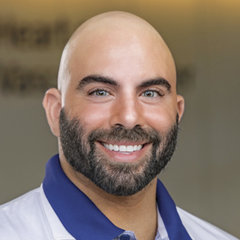Brain Mapping Charts Successful Course for Tumor Treatment
Advanced technology offers patients and families new hope for recovery
 DAYTON, Ohio (August 21, 2019) – Thanks to insights gained through brain mapping, physicians can now provide a more highly individualized plan for patients with brain tumors.
DAYTON, Ohio (August 21, 2019) – Thanks to insights gained through brain mapping, physicians can now provide a more highly individualized plan for patients with brain tumors.
Brain mapping is a series of tests and procedures designed to help specialists identify areas that host specific functions such as language, memory, judgment, or movement. Brain mapping technology has brought on a dramatic change by enabling the surgical removal of tumors that would have been previously deemed as too risky to touch without causing permanent damage.
“Not long ago, patients with primary brain tumors that were of a higher grade were often told to go home and begin making their final arrangements since there were limited therapeutic options. This isn’t the case anymore.” said Ania Pollack, MD, a neurosurgeon, fellowship-trained neuro-oncologist and Director of the Neuro-Oncology Program with the Clinical Neuroscience Institute (CNSI). “We want to maximize the resection of the tumor while preserving quality of life. Today, brain mapping tools can tell us just how much of the tumor can be resected without damaging those critical cognitive areas.”
 Dr. Pollack stresses that the assessment process is unique to each person, which is why brain mapping tools remain so vital to evaluate and treat each case. Brain mapping helps surgeons differentiate between treatments that would cause permanent damage versus treatment that would allow for a higher quality of life. It also equips them with crucial information to help tailor post-surgical therapy and recovery, and can even help reveal unique changes in the brain’s structure due to a tumor’s presence.
Dr. Pollack stresses that the assessment process is unique to each person, which is why brain mapping tools remain so vital to evaluate and treat each case. Brain mapping helps surgeons differentiate between treatments that would cause permanent damage versus treatment that would allow for a higher quality of life. It also equips them with crucial information to help tailor post-surgical therapy and recovery, and can even help reveal unique changes in the brain’s structure due to a tumor’s presence.
Brain mapping is not unfamiliar to the medical community, and is most closely identified with a procedure known as awake craniotomy – a neurosurgical technique that allows a specialist to pinpoint key brain functions in relation to a tumor’s location.
However, CNSI’s Brain Mapping Center – the first brain mapping center in the Midwest - goes beyond that and offers a broad range of diagnostic services that are unique to this region, and sought out by patients beyond the Greater Dayton area. The Brain Mapping Center utilizes additional diagnostic tools, that are often less invasive - such as neurocognitive testing, functional MRI, and the Wada procedure - to ensure a greater degree of functional mapping accuracy.
“A functional MRI not only shows you the location of different functions such as speech, motor skills, or vision, but also utilizes a technology called Diffusion Tensor Imaging to detect and reveal their neurological communication pathways as well,” said Dr. Pollack, who practices with Premier Physician Network.
This information is invaluable for surgeons since it allows them to plot a course that focuses exclusively on the tumor’s removal without damage to these pathways and their specific functions.
“With many brain tumors, we tend to see significant displacement of essential brain regions and their white matter tracts due to the tumor growth process,” said Fadi M. Tayim, PhD, director of the CNSI Brain Mapping Center. “Through various brain mapping techniques, we can determine the extent of brain function in the presence of this tumor and plan its removal with minimal side effects. It's an involved process, but one that helps ensure that patients live the most maximal life possible.”
Dr. Tayim is one of the few specialists in the United States who focuses on pre- and post-surgical functional mapping. The Clinical Neuroscience Institute’s Brain Mapping Center is one of fewer than 50 facilities nationwide that offer the full breadth of this groundbreaking technology to its patients and their families. CNSI operates out of five offices: Miami Valley Hospital in Dayton, Miami Valley Hospital South in Centerville, Miami Valley Hospital North in Englewood, Upper Valley Medical Center in Troy and Atrium Medical Center in Middletown.
For more information on brain mapping or to find a Premier Physician Network physician near you, visit www.PremierHealth.com.
Contact Us
Discover more about Premier Health and join us in building healthier communities in Southwest Ohio. Learn more about working at Premier Health, becoming a volunteer, and making a gift to support our mission.

